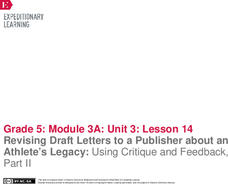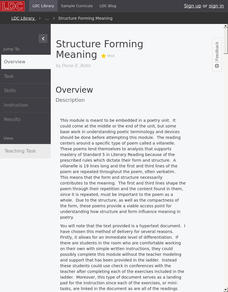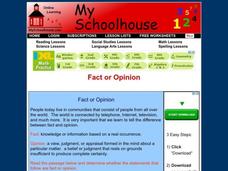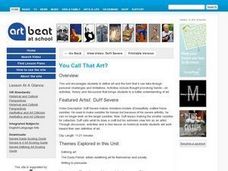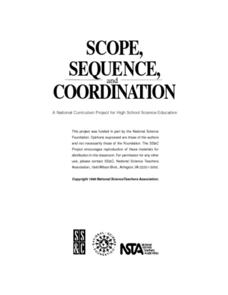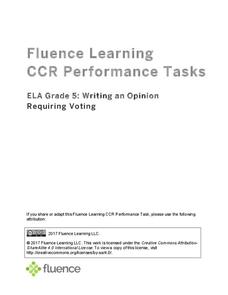Curated OER
Identifying Facts and Forming Opinions
Kirsten Hall's animal books provide learners with an opportunity to practice forming statements of opinions and factual statements. Using sentence starters such as "I learned. . ." and "I think. . ." class members craft sentences cite a...
Curated OER
Opinion
An important concept for youngsters to learn is that there is a difference between facts and opinions. Use Kirsten Hall's Animal Touch to introduce the idea that an opinion is how one feels or thinks about something and that others are...
EngageNY
Revising Draft Letters to a Publisher about an Athlete’s Legacy: Using Critique and Feedback, Part II
Let's get opinionated. Scholars participate in a peer critique and revision process using a fun activity called a Four Corners strategy. After incorporating classmates' feedback, individuals share their final drafts of their opinion...
College Board
2004 AP® English Language and Composition Free-Response Questions Form B
Are there unspoken rules everyone should follow? Questions from the 2004 AP® English Language and Composition Form B ask scholars to give opinions on how unspoken rules help people belong in society. Pupils also analyze a writer's...
Literacy Design Collaborative
Structure Forming Meaning
Teach literary lovers how to form opinions about form. Scholars read
informational text about the form used in villanelles. After analyzing
the structure used in the poetry with graphic organizers and gallery
walks, writers create...
College Board
2003 AP® English Language and Composition Free-Response Questions Form B
You took the words right out of my mouth! One question in 2003 AP® English Language and Composition Free-Response Questions Form B allows scholars to develop opinions on pupils receiving zeros for plagiarism. Other essays analyze ideas...
College Board
2008 AP® English Language and Composition Free-Response Questions Form B
Ever feel like resources limit pupils with multiple-choice questions? Writers receive freedom of expression with three free response questions. Topics include text read in high school English, opinions on American education, and...
College Board
2002 AP® English Language and Composition Free-Response Questions Form B
"Don't go forth today." Why would Caesar's wife not persuade him to stay home? Scholars read an excerpt from the play Julius Caesar and write essays on why Caesar listened to Decius rather than his wife. Pupils then write two more essays...
Curated OER
Inferences/Opinions
Fourth graders practice making inferences and forming opinions. In this reading strategy lesson, 4th graders listen to the book Woodsong by Gary Pauisen. They make predictions about the story before beginning and discuss the story as...
Curated OER
Fact or Opinion
In this online interactive fact or opinion worksheet, students read a brief selection and respond to 10 multiple choice questions that require them to determine whether the 10 statements are facts or opinions.
Curated OER
Forming an Opinion with Organizational Elements - Cats, Yesterday and Today
In this age of information overload, it is often difficult for young people to know what they think about a topic. The graphic organizer, video, and activities included with this resource show middle schoolers how to use proven facts to...
Curated OER
You Call That Art? - Activity 1
Learners formulate a definition of art in the introductory lesson for a unit on various art forms. The learning emphasis is placed on Oregonian artist Duff Severe and reflective writing. Students compose an essay describing various art...
Curated OER
Carbon Bonds in Chemistry
Venture into the world of macromolecules with three exciting, distinct laboratory activities. Young chemists examine the forms of carbon and discover how they are associated with atomic arrangement, construct models of carbon-containing...
Teaching Tolerance
Where We Stand
Everyone is entitled to their own opinion. Academics learn strategies to share their opinions and agree or disagree with others in a respectful manner. The resource provides scenarios to help individuals form opinions and share them with...
Fluence Learning
Writing an Opinion Requiring Voting
Challenge writers to compose an essay detailing their stance on, and the history of, voting. Three assignments, each broken down into three parts, requires fifth graders to take notes, read and complete charts, write paragraphs, compare...
Fluence Learning
Writing an Opinion: Is Pride Good or Bad?
Does pride really goeth before the fall, or can it be essential to one's development? Second graders read two of Aesop's fables that refer to pride in their morals, and write a short essay about whether pride is good or bad, based on...
Teaching Tolerance
Buddy Share
Here's a project that gives academics the chance to share their opinions on social justice with storytelling, creative writing, or art. Scholars choose what they want to create and are assigned buddies to support their efforts. To...
Curated OER
Comparative and Superlative Forms
Learners practice identifying the comparative and superlative forms of language. The second phase of the instructional activity focuses on using the comparative and superlative forms actively in small group conversation.
EngageNY
Peer Critique and Revision: Editorial Essay
Get those red pens ready! Using the Peer Critique protocol, scholars provide and receive feedback on their editorial essay drafts. They then use class time to work on revisions.
EngageNY
Forming Evidence-Based Claims: Should Lyddie Sign the Petition?
Pupils reread selected passages from Katherine Paterson's novel Lyddie. After they finish, individuals gather textual evidence supporting whether Lyddie should sign a controversial petition and record their findings on graphic organizers.
Cornell College
Dred Scott v. Sandford Supreme Court Decision
Dred Scott was a harbinger of the Civil War. An enslaved man claimed freedom because his owner had taken him into free territory. Not only did the Supreme Court rule that Dred Scott and his wife were to remain enslaved, but it also ruled...
Curated OER
School Newspaper
Fifth graders run a school newspaper on a school website and discover how to use various literary forms as they relate to the writing process. For this school newspaper lesson, 5th graders synthesize information from different sources,...
Curated OER
Good News/Bad News/Who Cares?
Young scholars practice evaluating facts, bringing to bear their own experience, preferences, and international contexts. They recognize that there are many ways of interpreting a single piece of information and form the habit of...
EngageNY
Final Performance Task: Critique and Revision, Part I
Let's work together! Scholars engage in the peer editing protocol, giving and receiving feedback on their draft opinion speeches. They then use classmates' feedback to begin working on their revisions.




